B.E. Smith Team | August 28, 2017
INTERIM LEADERSHIP: NEW SURVEY OFFERS CAREER INSIGHTS FOR HEALTHCARE EXECUTIVES
Interim executives continue to play an important role in talent management. B.E. Smith recently completed its annual Interim Intelligence Survey of current and former interim healthcare leaders. Respondents provided insights across a range of topics relevant to the career strategies, aspirations, and interests of active and prospective interims. This white paper distills key results and themes.
SNAPSHOT OF TODAY’S INTERIMS
A clear portrait of interim executives emerges from the demographic responses:
- Healthcare-specific experience, a consistently important criterion for hiring clients, ranged from 4 to 49 years, with the average at 33 years.
- Similar to last year’s findings, areas of specialization were led strongly by Operations and Quality/Performance Improvement. These are core skills hospitals seek in interim leaders. The next two leading responses reflect strategic priorities that have emerged in recent years: Patient Engagement/Experience and Patient Safety.

- B.E. Smith interim leaders make an impact in leadership ranks, with two-thirds having executed director-level through C-suite engagements.
- By a significant margin “assessing organizational needs” topped the list of self-described professional strengths. Also receiving significant responses were establishing interdepartmental relationships, implementing strategy with limited resources, and introducing new ideas.
INTERIM IS A CAREER
Being an interim executive is a career choice for most rather than a temporary assignment, and survey respondents clearly find it a satisfying one. The greatest fulfillment comes from the high levels of responsibility engagements provide (31%) and the opportunity to solve significant client problems (30%). Also mentioned prominently by almost 20% of respondents, is the satisfaction derived from working in a variety of settings and the career opportunities provided.

Candidates are always interested in understanding what influences executives to pursue interim leadership. As Figure 1 indicates, the ability to maintain an independent and flexible lifestyle ranked as the top factor, with applying knowledge to create customized client solutions coming in a close second. The value placed on flexibility bespeaks the mounting workforce shifts resulting from the baby boomer generation entering retirement age and pursuing alternative careers like interim management. At the same time, industry transformation is placing a premium on hospitals finding the kind of custom solutions interim leaders provide. Other leading motivators support the diversity of the work and include sharing one’s experience with others, valued expertise, and varied assignments.
These positive experiences and factors led 59% of interim leaders to express high satisfaction with their career choice, with another 34% saying they were satisfied. The depth of satisfaction is underscored by the findings that 65% are highly likely to continue working as an interim, and 55% are highly likely to recommend the career to peers.
SUCCESS FACTORS IN INTERIM LEADERSHIP
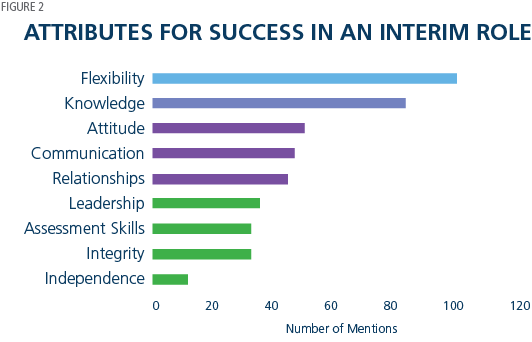 The Interim Intelligence Survey also examined the traits and attributes that are essential to a successful career as an interim leader. Full results are displayed in Figure 2. As in last year’s survey, flexibility to address a wide range of challenges was the dominant success requirement. Other significant mentions were knowledge, attitude, communication, and relationship-building. These responses align with findings from a similar survey of B.E. Smith clients. Findings from the client survey show that organizations engage interim leaders for a broad spectrum of assignments and highly value their ability to bring “experience and expertise” to the task.
The Interim Intelligence Survey also examined the traits and attributes that are essential to a successful career as an interim leader. Full results are displayed in Figure 2. As in last year’s survey, flexibility to address a wide range of challenges was the dominant success requirement. Other significant mentions were knowledge, attitude, communication, and relationship-building. These responses align with findings from a similar survey of B.E. Smith clients. Findings from the client survey show that organizations engage interim leaders for a broad spectrum of assignments and highly value their ability to bring “experience and expertise” to the task.
The Interim Intelligence Survey analyzed specific comments for additional insight into the leading factors of a successful career in interim leadership. Four key themes emerged:
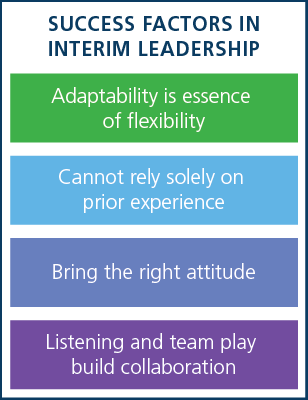 ADAPTABILITY IS ESSENCE OF FLEXIBILITY
ADAPTABILITY IS ESSENCE OF FLEXIBILITY
Respondents consistently described the need to adjust to different management scenarios as the essence of flexibility. Adapting to three aspects of an organization emerged from the commentary:
- Philosophy – approach to market and strategy
- Culture – tolerance for and accepted pace of change need to be understood
- Work Environment – especially where one “may not be conducive to your leadership style”
CANNOT RELY SOLELY ON PRIOR EXPERIENCE
Interim leaders must bring solid domain knowledge to the table in addition to practical experience. With today’s healthcare environment characterized by fundamental business model transformation and movement to a variety of new delivery approaches, specialized knowledge is often crucial. An interim’s knowledge must be:
- Current – particularly regarding regulatory trends and requirements
- Attuned to best practices – organizations frequently look outside for this advice
- Broad – derived from multiple experiences which adds depth and confirms validity
Applying relevant knowledge also entails attributes interim leaders must display. Frequently mentioned were being a fast learner, open to new ideas, and “willing to share knowledge when asked.”
BRING THE RIGHT ATTITUDE
This success factor jumped to third place in this year’s Interim Intelligence Survey. Attitude is multi-faceted. Interim leaders offered such frequent descriptors as approachable, confident, energetic, open, and non-judgmental. One respondent perhaps summed up the attitudinal requirement best: “a strong and confident personality that can work with others to successfully effect change.”
LISTENING AND TEAM PLAY BUILD COLLABORATION
Strong communication emerges consistently in B.E. Smith research as a core leadership skill. Interim executives are no exception. This year’s survey revealed a heavy emphasis on two key elements of communication central to interim effectiveness: listening and working as part of a team. Specific listening capabilities to be refined include frequently listening first before offering your thoughts, listening in a positive fashion, and validating what you hear. The focus on team building plays directly to the collaborative nature of many healthcare initiatives today. Being able to relate well with all levels of staff is a prerequisite, but interim leaders also underscored the high value in collegiality, consensus building, displaying ownership of objectives, and developing trust. Current and prospective interim executives would do well to cultivate these skills in order to maximize their influence.
CHALLENGES PRESENT OPPORTUNITIES
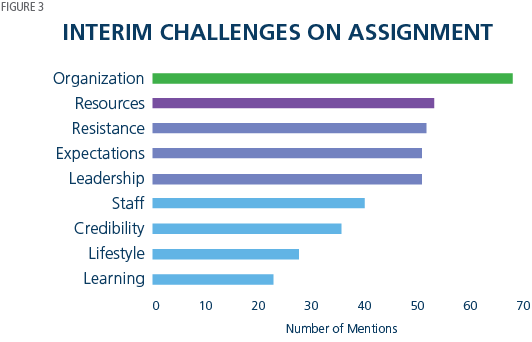 The many rewards that accrue to the interim leadership role do not come without challenges along the way. Each organization presents a unique set of structural, procedural, and cultural characteristics that create challenges, but also valuable opportunities for interim leaders. Figure 3 shows the top responses to the survey question regarding chief challenges encountered during an engagement. B.E. Smith analyzed specific responses and comments to further contextualize each of the leading challenges.
The many rewards that accrue to the interim leadership role do not come without challenges along the way. Each organization presents a unique set of structural, procedural, and cultural characteristics that create challenges, but also valuable opportunities for interim leaders. Figure 3 shows the top responses to the survey question regarding chief challenges encountered during an engagement. B.E. Smith analyzed specific responses and comments to further contextualize each of the leading challenges.
ORGANIZATIONAL BARRIERS
Interim leaders pointed to an issue that is fairly ubiquitous in healthcare, namely, organizational silos. Information, process steps, and decision authority within silos is challenging for the organization as well as the interim leader. It also presents an opportunity for the interim to have a greater impact on the organization’s culture. Navigating complex organizational barriers requires an interim leader who is skilled in gaining institutional knowledge quickly, is a strong communicator, and is able to influence across departments and an organization.
RESOURCE CONSTRAINTS
It is essential interim leaders achieve goals and outcomes with the resources available in the organization. Interim leaders may experience resource constraints, including financial or personnel limitations. These challenges provide the interim leader an opportunity to utilize their experiences and fresh perspectives to work with organizational leadership to create innovative solutions to overcome these barriers.
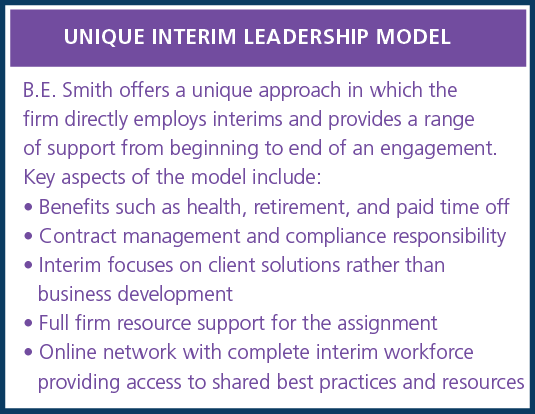 INTERNAL RESISTANCE
INTERNAL RESISTANCE
Even when organizational and resource factors are aligned with interim needs, resistance from internal staff can present a barrier. Often the resistance is broader, with staff struggling to change from “a deeply ingrained status quo.” Additionally, staff may perceive interim leaders as temporary caretakers or change agents brought in specifically to cut staff or expenses. Interim leaders who utilize an open, transparent, and collaborative leadership approach successfully overcome these staff challenges. In many cases they build stronger relationships across the department or organization, and positively impact overall efficiency as well as clinical, financial, and operation outcomes.
EXPECTATIONS
B.E. Smith partners with organizations to establish and communicate clear objectives up front, before the start of an interim engagement. This ensures the interim leader understand the goals, desired outcomes, and timelines of the assignment. It also minimizes the risk an interim leader will encounter mismatched expectations.
SATISFACTION WITH B.E. SMITH RELATIONSHIP
The survey sought to ascertain the success of B.E. Smith’s unique direct employment business model (see sidebar) in meeting the needs of interim executives. Key results include:
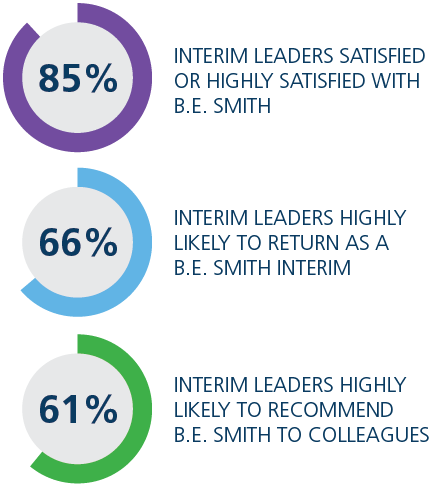 Overall satisfaction is very strong with 85%registering “highly satisfied” or “satisfied.”
Overall satisfaction is very strong with 85%registering “highly satisfied” or “satisfied.”- Further endorsement comes from two-thirds of interim leaders saying they are highly likely to return as a B.E. Smith interim, while 61% cite high likelihood to recommend B.E. Smith to colleagues.
- Respondents significantly cited B.E. Smith corporate support as a key driver of satisfaction. Additionally, interim leaders enjoyed the opportunity to apply their talents and expertise. Probing further on the support question shows that interim leaders most prize B.E. Smith’s communication with them and responsiveness to their needs.
- A key test of responsiveness comes when problems inevitably arise. Only one-third of the interim leaders said they experienced an issue on an engagement. Nearly all contacted the firm, and 72%indicated that the problem was resolved successfully.
CONCLUSION
The 2017 Interim Intelligence Survey again provided a window on the attitudes and experiences of interim leaders. The insights revealed can help active and aspiring interims navigate this rewarding career path. If you are considering a career in interim leadership or seeking a new interim opportunity, B.E. Smith is ready to assist. As the healthcare industry’s leading provider of interim leadership services, we have the resources and experience to help you advance your career.
Read More